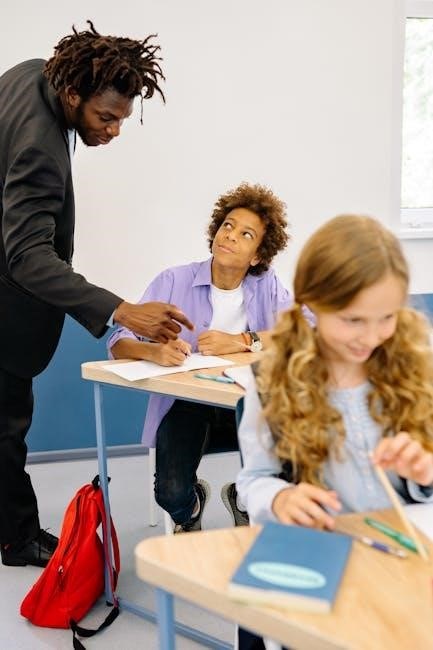Role of a Special Education Instructional Assistant
Special education instructional assistants support teachers by assisting students with disabilities, modifying materials, and monitoring progress. They help create inclusive environments and foster social-emotional growth.
1.1 Key Responsibilities in the Classroom
Special education instructional assistants assist teachers in delivering lessons, support students with disabilities, and adapt materials. They monitor progress, provide individualized attention, and use assistive technologies. Responsibilities include maintaining a safe learning environment, documenting student performance, and collaborating with other staff. They also help with behavioral support and ensure students engage in activities, fostering independence and inclusion.
1.2 Importance of the Role in Special Education
The role of a special education instructional assistant is vital in supporting students with diverse needs. They bridge the gap between teachers and students, ensuring individualized attention and tailored support. By fostering an inclusive environment, they help students achieve academic and social goals. Their presence enhances the effectiveness of special education programs, making a significant difference in students’ overall development and success.
1.3 Skills and Qualities Required for Success
A successful special education instructional assistant must possess patience, empathy, and strong communication skills. They need adaptability to handle diverse student needs and the ability to implement individualized learning plans. Organizational skills are crucial for managing materials and tracking progress. Additionally, a positive attitude and commitment to fostering an inclusive environment ensure they effectively support both students and educators, contributing to meaningful educational outcomes.

Educational Requirements and Certifications

Special education instructional assistants typically require a high school diploma, relevant certifications, and specialized training to effectively support students with diverse needs and ensure successful educational outcomes.
2.1 Necessary Certifications and Training
Special education instructional assistants often require certifications like paraeducator certifications, first aid, and CPI training. They may need state-specific credentials and participate in ongoing professional development to stay updated on teaching methods, legal standards, and student support strategies. Proper training ensures they can effectively assist teachers, manage classroom behaviors, and provide individualized support, enhancing their ability to contribute to student success and inclusion in educational settings.
2;2 Impact of Proper Training on Student Outcomes
Proper training significantly enhances instructional assistants’ effectiveness, leading to improved student outcomes; It ensures they can provide tailored support, manage behaviors, and adapt teaching strategies. Well-trained assistants foster inclusive environments, promoting academic success and social-emotional growth. This contributes to students achieving their IEP goals and thriving in educational settings, underscoring the importance of ongoing professional development for instructional assistants.

Effective Instructional Strategies for Special Needs Students
Differentiated instruction, assistive technologies, and AI tools help tailor learning experiences for special needs students, promoting engagement and academic success while addressing individual learning styles.
3.1 Evidence-Based Practices in Special Education
Evidence-based practices in special education involve scientifically proven methods like systematic instruction, explicit teaching, and positive behavioral supports. These strategies, backed by research, ensure students with disabilities achieve measurable progress. Techniques such as visual supports, assistive technologies, and data-driven interventions are widely recognized for improving academic and social skills. By aligning instruction with empirical evidence, educators create effective, individualized learning plans tailored to each student’s needs, fostering meaningful outcomes.
3.2 Differentiated Instruction Techniques
Differentiated instruction involves tailoring teaching methods to meet diverse student needs. Techniques include tiered assignments, learning centers, and technology integration. Instructional assistants can support by adapting materials, providing small-group instruction, and using assistive technologies. These strategies help students with varying abilities engage effectively, ensuring personalized learning experiences that cater to their unique strengths and challenges, promoting academic and social growth.

Legal and Ethical Considerations
Special education assistants must adhere to laws like IDEA, handle IEPs confidentially, and uphold ethical standards to ensure students’ rights and privacy are protected.
4.1 Understanding Special Education Laws (IDEA, IEPs)
Special education instructional assistants must understand IDEA, ensuring free, appropriate public education for students with disabilities. They support IEP development, outlining tailored goals, services, and accommodations, collaborating with teachers to implement plans and monitor progress, ensuring legal compliance and fostering inclusive learning environments.
4.2 Maintaining Confidentiality and Ethical Standards
Special education instructional assistants must adhere to FERPA and ethical standards, ensuring student confidentiality. They handle sensitive information discreetly, avoiding discussions in public areas. Sharing student details on social media or with unauthorized staff is strictly prohibited. Ethical practices, such as respecting privacy and maintaining professional boundaries, are crucial for fostering trust and a positive learning environment for students with special needs.

Collaboration with Teachers and Other Educators
Special education instructional assistants collaborate with teachers and educators to implement IEPs, share strategies, and ensure cohesive support, fostering a team-oriented approach for student success.
5.1 Working Effectively with Special Education Teachers
Instructional assistants work closely with special education teachers to support individualized education plans (IEPs). They assist in preparing materials, monitoring student progress, and implementing tailored strategies. This collaboration ensures consistent support, fostering an inclusive and effective learning environment. By maintaining open communication, they align their efforts to meet students’ diverse needs, enhancing academic and social development.
5.2 The Role of Parental Involvement in Education
Parental involvement is crucial in special education, as parents provide unique insights into their child’s needs and strengths. They collaborate with teachers to develop IEPs, ensuring personalized goals. Regular communication and participation in school activities foster consistency between home and classroom. Parents’ active roles empower students, reinforcing academic and social progress. Their advocacy ensures tailored support, promoting a holistic educational experience.

Technology Integration in Special Education
Technology enhances learning for special needs students by providing assistive tools and personalized resources, making education more accessible and engaging while fostering independence and skill development.
6.1 Assistive Technologies for Student Support
Assistive technologies, such as text-to-speech and speech-to-text tools, enable students with disabilities to engage with content more effectively. These technologies help students with reading, writing, and communication challenges, fostering independence and confidence. Interactive educational apps and adaptive devices also support diverse learning needs, ensuring students can access the curriculum and participate fully in classroom activities. These tools are essential for creating an inclusive and supportive learning environment.
6.2 Using AI Tools to Enhance Learning Experiences
AI tools empower special education by personalizing learning experiences and addressing diverse needs. Adaptive software adjusts content difficulty, while speech-to-text and text-to-speech tools aid communication. AI-driven platforms provide real-time feedback, enabling students to track progress and build confidence. These tools also reduce teachers’ administrative burdens, allowing more focus on instruction. However, privacy and ethical considerations must be addressed to ensure responsible use of AI in special education settings.

Professional Development and Growth
Continuous learning and skill enhancement are vital for special education assistants. Staying updated with best practices, workshops, and certifications ensures effective support. Building a supportive professional community fosters collaboration and innovation, while leveraging AI tools aids in professional development and improved student outcomes.
7.1 Staying Updated with Best Practices
Staying updated with best practices is crucial for special education instructional assistants. Continuous learning through workshops, certifications, and evidence-based resources like the What Works Clearinghouse ensures effective support. Engaging in professional development fosters innovation and adaptability, enabling assistants to address diverse student needs. Leveraging AI tools and emerging technologies also enhances instructional strategies, promoting better student outcomes and streamlined processes. Ongoing education ensures assistants remain equipped to meet modern educational challenges.
7.2 Building a Supportive Professional Community
Building a supportive professional community is vital for special education instructional assistants. Collaboration with teachers, sharing resources, and collective problem-solving foster a culture of mutual support. Professional development opportunities, such as workshops and online forums, enhance knowledge and teamwork. A strong community ensures assistants stay informed, share strategies, and advocate for students’ needs, creating a cohesive and effective support system for both educators and learners.

Challenges Faced by Instructional Assistants
Challenges include managing diverse student needs, balancing instructional and behavioral support, and addressing emotional and physical demands while maintaining confidentiality and adapting to evolving educational requirements.
8.1 Managing Diverse Student Needs
Instructional assistants face challenges in managing diverse student needs, including varying learning abilities, behavioral issues, and individualized requirements. They must adapt strategies to support each student effectively, ensuring personalized attention and fostering an inclusive environment. This requires strong organizational skills, patience, and the ability to implement tailored interventions. Collaboration with teachers and other educators is crucial to address these diverse needs successfully and promote student well-being.
8.2 Balancing Instructional and Behavioral Support
Instructional assistants must balance academic instruction with behavioral support, addressing students’ diverse needs. They implement behavioral plans, provide positive reinforcement, and ensure a structured environment. Managing challenging behaviors while maintaining focus on learning requires adaptability and strong interpersonal skills. By tailoring strategies to individual needs, assistants help students stay engaged academically and behaviorally, fostering a productive learning environment and promoting overall student success and well-being.

Impact on Student Academic and Social Outcomes
Special education instructional assistants play a crucial role in fostering academic and social growth. They provide tailored support, helping students achieve goals and develop essential life skills effectively.
9.1 Supporting Academic Success
Special education instructional assistants provide tailored support to enhance academic performance. They use evidence-based practices, adapt materials, and deliver individualized instruction. By breaking tasks into manageable steps and offering consistent feedback, they help students build confidence and mastery. Their role in reinforcing learning objectives ensures students meet their IEP goals, fostering independence and academic growth in a supportive environment.
9.2 Fostering Social-Emotional Development
Special education instructional assistants play a crucial role in promoting social-emotional growth. They model positive behaviors, teach empathy, and encourage self-regulation. By fostering inclusive environments and providing individualized support, they help students develop friendships and navigate social interactions. Instructional assistants also use evidence-based practices to address emotional challenges, ensuring students build resilience and confidence, which are essential for long-term personal and academic success.
The Future of Special Education Support Roles
The future of special education support roles involves integrating AI tools and assistive technologies to enhance learning experiences. Instructional assistants will focus more on personalized support and collaboration with educators to meet diverse student needs, ensuring inclusive and adaptive education environments.
10.1 Emerging Trends in Special Education
Emerging trends in special education include the integration of AI tools and assistive technologies to enhance learning experiences. Personalized learning plans and data-driven instructional strategies are becoming more prevalent. There is also a growing emphasis on collaboration between educators, families, and support staff to create inclusive environments. Additionally, cultural responsiveness and trauma-informed practices are gaining attention to better support diverse student needs and ensure equitable education opportunities.
10.2 The Evolving Role of Instructional Assistants
The role of instructional assistants is expanding to include technology integration, personalized learning support, and collaborative team-based approaches. With advancements in AI and assistive tools, assistants now play a key role in leveraging technology to enhance student learning. There is also a growing emphasis on cultural responsiveness and trauma-informed practices, requiring assistants to adapt and refine their strategies to meet diverse student needs effectively.
